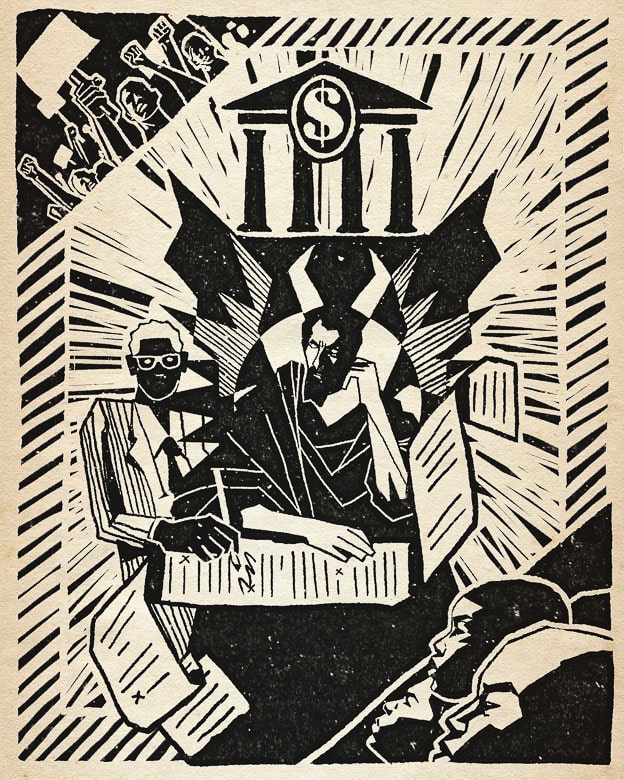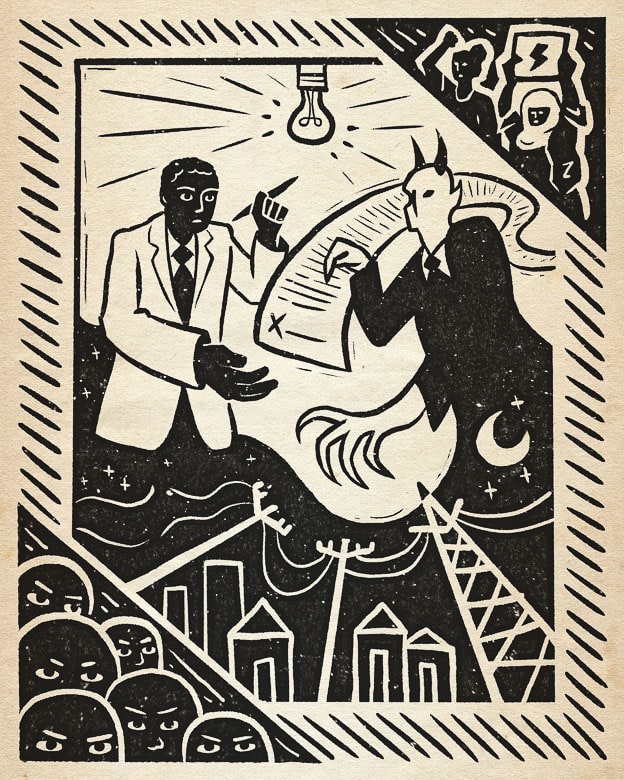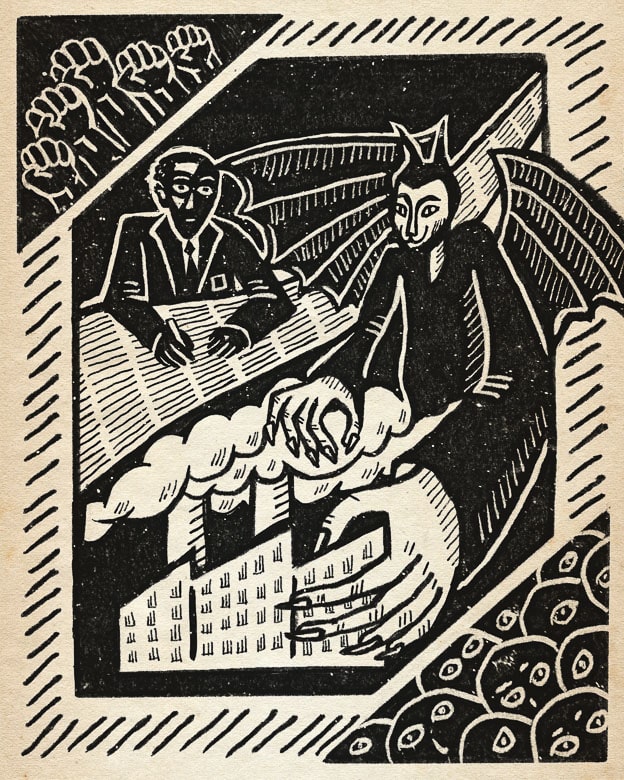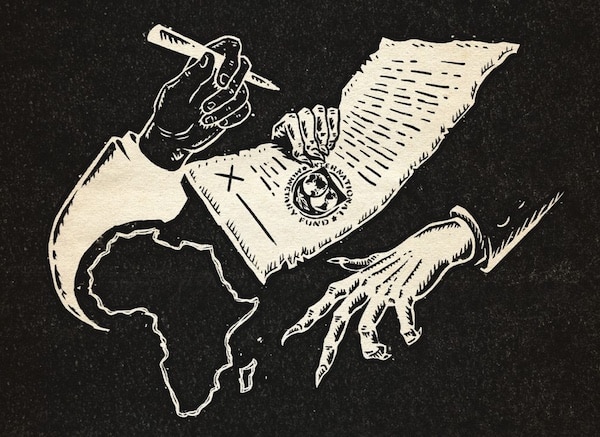Dear friends,
Greetings from the desk of Tricontinental: Institute for Social Research.
At the start of 2025, Sudan registered an alarming debt-to-GDP (Gross Domestic Product) ratio of 252%. This means that the country’s total public debt is 2.5 times the size of its entire annual economic output. It is not hard to understand why Sudan is in such dire straits: as we outlined in last week’s newsletter, the country has been engulfed in a conflict for decades, which has severely disrupted any possibility of economic growth and financial stability. Yet, in a way, Sudan—one of the richest countries in terms of resources but poorest in terms of household income and wealth—is also representative of what has been happening on the African continent. As of 2022, the average debt-to-GDP ratio in Sub-Saharan countries was 60%, having doubled from 30% in 2013. This rise in indebtedness is shocking.
Africa’s total debt is over $1 trillion, with debt servicing costs of $163 billion per year. Developing countries’ total debt reached $11.4 trillion in 2023, four times the 2004 total of $2.6 trillion. This extraordinary increase has induced a debt crisis in over thirty out of sixty-eight low-income countries. This ballooning debt impacts development in two primary ways:
- Due to an increased risk of default, further credit becomes very expensive and is often only available through commercial lenders. Africa’s total commercial debt is now 43% of its total external debt—more than twice what it was in 2000.
- High debt servicing limits fiscal flexibility, forcing many governments to cut spending on education, healthcare, industrial development, and infrastructure. In many African countries, this has led to austerity measures across the board: in 2022, twenty-two countries spent more paying interest on their debt than on healthcare and six of them spent more on debt service than on education. A high debt burden ultimately leads to austerity measures, and therefore to economic contraction.
Only a handful of African countries have been able to immunise themselves from the crisis, largely because they have smaller populations and export high-value goods. One of these countries is Equatorial Guinea, which has a population of 1.8 million, earns $5.13 billion per year (largely from crude oil and natural gas exports), and has a debt-to-GDP ratio of 31.3%. Another is Botswana, which has a population of 2.5 million, earns $5.33 billion per year from diamond exports, and has a debt-to-GDP ratio of 27.4%.

Africa’s Faustian Bargain with the International Monetary Fund (May 2025) is the third in a series dossiers that examines the impact of Africa’s economic crisis (the first was Life or Debt: The Stranglehold of Neocolonialism and Africa’s Search for Alternatives in April 2023, followed by How Neoliberalism Has Wielded ‘Corruption’ to Privatise Life in Africa in November 2024). This three-part series, written by Senior Fellow Grieve Chelwa and me, will be published by Inkani Books later this year in an expanded form and with a substantial introduction.
The series argues that:
- The colonial era impoverished the African continent of both its wealth and its people, millions of whom were captured, taken to the Americas, and brutally enslaved. By the time African countries won their independence in the 1960s and 1970s, they simply did not have the state resources or accumulated capital in the hands of the private sector necessary for major infrastructure construction and industrialisation.
- African countries that attempted to amass domestic savings and borrow from the socialist bloc for major infrastructure projects—such as dams and electricity systems that had been neglected wilfully by the colonial rulers—faced assassinations (the Congo’s Patrice Lumumba in January 1961 and Burundi’s Louis Rwagasore in October 1961) and coups (Ghana’s Kwame Nkrumah in February 1966).
- The neocolonial system structured the world economy in such a way that African countries have been compelled to sell their raw materials for low prices; earn minimal royalties from Western multinational corporations; pay high prices for imported finished products (in many cases for energy sources); borrow money through the International Monetary Fund (IMF) and Western commercial creditors to cover their budgetary shortfall; pay high debt service fees; implement austerity programmes at the behest of the IMF; and then enter into a debt spiral seemingly for eternity.
- The IMF and its various associated agencies (such as Transparency International) pressure governments in vulnerable African countries to further erode their state capacity by shutting down regulatory departments and reducing their own competence to negotiate agreements with Western creditors and multinational mining companies. A shrunken state means that the people in that country—and the continent as a whole—have less power to negotiate within the neocolonial structure.

In our latest dossier, we show how the IMF’s new policy on the African continent is much like its old policy (as is the case elsewhere in the world, as we discuss in our October 2023 dossier, How the International Monetary Fund Is Squeezing Pakistan). We provide a short summary of the continued attempts to build African financial institutions, such as an African Central Bank, an African Investment Bank, a Pan-African Stock Exchange, and an African Monetary Fund. The target date set to build these has already passed, but the need for them remains on the African Union’s Agenda 2063 (set in 2013). We also make the case for regionalism on the continent using the debate around the African Continental Free Trade Area. There is no easy panacea. At the end of the dossier, we look at the case of Senegal to understand the challenges facing countries that assert their sovereignty. When the country’s new progressive government, led by Diomaye Faye, audited the data reported to the IMF and showed that some of it was erroneous, the IMF responded by suspending Senegal’s $1.8 billion credit facility. Now what is Senegal to do? Faye’s government will go back to the IMF in June. We end the dossier by asking: ‘Will other paths open up for Senegal, or will it be fated to trudge through the IMF debt-austerity agenda that has plagued countries of the Global South for decades?’.

The year before the pandemic, I flew from Uganda’s Entebbe airport to the town of Kisoro, near the border with the Democratic Republic of the Congo (DRC). A guide named Katende and I drove to the border that goes through the town of Bunagana, where the M23 rebel group (the March 23 Movement, backed by Rwanda) had taken up residence on the DRC side of the border. We passed through the beautiful green hills of southwestern Uganda until arriving at the largely deserted town and desolate border post. There had been discussions about upgrading the border post because of the large volume of goods that crossed on both sides. But now, as a result of the ongoing war, all that is visible are a few bicycles, often just waved through by lackadaisical guards and customs officials.

Through Katende, I spoke to a few people who were milling around a small shop called a duuka (from the Hindi dukan, brought to this part of Uganda by Indian traders known in the old days as dukwallas). At this shop, I met an elderly trader who often crossed the border with goods from the DRC. What kind of goods? All kinds, sometimes also diamonds. Her name was Ssuubi and she spoke Luganda. She said something that made Katende laugh. I asked what it was. He took my notebook and wrote down what she had said: Akakonge ak’omu kkubo. Bwe katakukuba magenda, kakukuba amadda. Then he handed me the notebook in which he had written: ‘If the small stump of a tree in the path does not trip you on your way, then it will trip you on your return’. I suspect that Ssuubi was talking about smuggling and customs guards. But perhaps this was just a reflection of life, with fate at the heart of her poverty despite being involved in smuggling diamonds—so inexpensive here yet so expensive by the time they get to the Gulf states and Antwerp and, eventually, high-end jewellery shops around the world.
Ssuubi will remain at the duuka buying a juice, eating a packaged meal, standing in the sun waiting to see if it is safe to cross the border and then deal with the M23 gunmen on the other side, find someone to sell her diamonds and other things, walk back, try not to trip, and, finally, sell the diamonds for almost nothing to a dealer who will take them to the port in Mombasa, Kenya, where they will be shipped out of Africa. None of the people involved—the person who found the diamonds in the ground, the person who sold them to Ssuubi, Ssuubi herself, or the person who buys them from her and takes them to Mombasa—gain the wealth. By the time the ship docks in the Gulf states or Antwerp and finds its way to the person who will polish the diamonds, capital begins to accumulate. Before then, it is poverty that accompanies the jewels from hand to hand as those who do so live a hand-to-mouth existence. This is the reality of African wealth and its theft. This is what lies beneath the debt burden and the IMF austerity agenda.
Warmly,
Vijay

